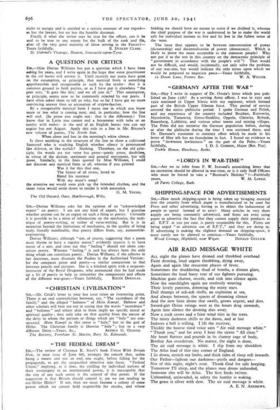A QUESTION FOR CRITICS
SIR,—Miss Dorian Williams has put a question which I have been asking for years, and I write again in the hope that some practitioner in the stil nuovo will answer it. Until recently our poets have gone on the assumption, or principle, that metrical form is something apprehensible and recognisable as such by the reader: that it is common ground to both parties, or as I have put it elsewhere "the poet says, ' It goes like this,' and we all join in." This assumption, or principle, seems now to be commonly rejected by our poets. I have often asked them to tell us why, but so far I have got no more convincing answer than an accusation of crypto-fascism.
By a recognisable metrical form I mean one in which you know more or less what is coming next, and, in particular, how the line will end. (In prose you ought not: that is the difference.) You know that in Latin you cannot end a hexameter with tuba or an iambic with nubes: at the end of an English heroic you can say august but not August. Apply this rule to a line in Mr. Binyon's new volume of poems, The North Star.
When alone and lost in the morning's white silence.
Is there anything in the structure of the line to show a cultivated Samoyed who is studying English whether silence is pronounced like defence, or like eyelids? Nothing. Therefore, on the old prin- ciple, the words are not verse but prose—poetic prose, doubtless, In virtue of the diction, sentiment and general movement, but still prose. Similarly, in the lines quoted by Miss Williams, I could not discover any metrical form at all, whereas if you printed Was it for this that one, The fairest of all rivers, loved to Blend his murmur With my muse's song?
the attentive ear would soon pick up the intended rhythm, and the inner voice would settle down to render it with assurance.
G. M. YOUNG.
The Old Oxyard, Oare, Marlborough, Wilts.


























 Previous page
Previous page